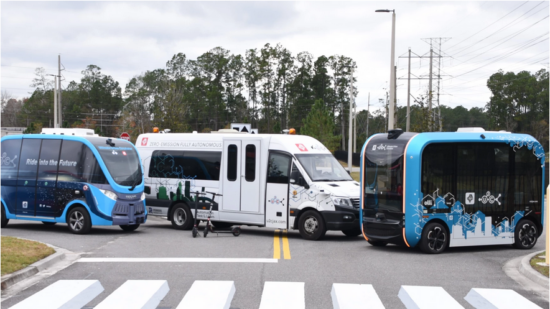SUMC’s Mobility Innovation Collaborative Hosts Presentation on Ultimate Urban Circulator AV Project in Jacksonville, FL, 2023
5 minutes Date: Feb 8, 2023

Summary
On February 8, 2023, the Shared-Use Mobility Center hosted a meeting for IMI and AIM grantees about automated vehicles and automation technology. During this meeting, Bernard Schmidt, Vice President of Automation and Innovation at the Jacksonville Transportation Authority (JTA), presented on the Ultimate Urban Circulator (U2C), an autonomous vehicle (AV) project.

This webinar is a product of the Mobility Innovation Collaborative (MIC) program. The MIC program provides a comprehensive suite of technical assistance resources, promotes knowledge sharing activities, and captures stories and lessons learned from nearly 50 innovative mobility projects across the United States.
Originally published March 2023, revised June 2025.
Description: Video recording of Bernard Schmidt’s presentation to SUMC’s Mobility Innovation Collaborative on U2C at JTA.
Credit: Shared-Use Mobility Center (SUMC)
U2C occurs across three phases:
- Phase 1: Bay Street Innovation Corridor (Current): Supported with a 2018 BUILD grant from the US Department of Transportation, JTA is focused on introducing AVs on a street-level transportation corridor in downtown Jacksonville.
- Phase 2 Skyway Conversion (Current): JTA is converting an existing elevated automated train system that runs on a 2.5-mile loop with eight stops into a system that supports AVs instead. Converting the Skyway from a system that supports trains to one that supports AVs is likely to place less strain on the physical infrastructure. The new design on the Skyway will also connect with the Bay Street Innovation Corridor.
- Neighborhood Extensions (Planned): JTA plans on ultimately extending the AV transit system into a southwest corridor, a north corridor, and a southbank corridor, expanding the reach of public transit in Jacksonville.
JTA is Phases 1 and 2 with federal dollars and gas tax revenues. For Phase 3, JTA hopes to leverage additional funding through public-private partnerships.
Through different U2C initiatives testing an autonomous vehicle ecosystem, the JTA has partnered with multiple private vendors, including: Navya, EasyMile, GreenPower Motor Company, GEM, Local Motors, Beep, and Perrone Robotics.
Find detailed documentation of the U2C Program Development here.
Watch a complete recording of Bernard Schmidt’s presentation here.
Last updated June 6, 2025